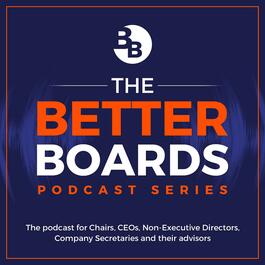
Being on the Board – Keeping it Simple | Sir John Tusa
Send us a text Amid global uncertainty, are boardrooms needlessly complex? Is It possible to thrive in the boardroom by keeping things simple? In this podcast, Dr Sabine Dembkowski, Founder and Managing Director of Better Boards www.better-boards.com, discusses being on the board with Sir John Tusa. Sir John has been known to the public as the main presenter of BBC2"s Newsnight and the Managing Director of some of the most iconic media and cultural centres in the United Kingdom. “The things that really make a difference are what I call the simple ones” Sir John suggests that although being on a board involves significant challenges in an increasingly complex world, it is not necessarily complicated. He explains that the complicated aspects of board service involve fundamental duties: understanding the organisation’s legal basis, following regulatory expectations, and recognising responsibilities toward shareholders or stakeholders. These regulatory and procedural tasks are necessary, but are only part of the board’s work. Simple, straightforward actions and values can truly make a difference. They hold substantial value in shaping the organisation’s success and fulfilling the board’s deeper purpose. “The more generous you can be with your time, the better it is for the organisation, and the better it is for you as a board member” Regarding time, Sir John also points out that when he was first invited to join the board of the English National Opera around 25 years ago, the chair reassured him that annual board commitments would be minimal. Since then, expectations have evolved significantly, and today board roles can easily demand 30 to 40 days or more per year. “When I hear the word board pack, I almost want to reach for my bonfire” He describes a frustration he has with the common organisational tactic where executives overload non-executive directors with extensive paperwork. In some organisations, this may be deliberate, to overwhelm non-executive board members with so much information that it becomes virtually impossible for them to thoroughly review or question it. This tactic, he argues, is a way for executives to discourage meaningful input from non-execs by drowning them in details. To counteract this, he advocates a slim board pack approach. “If you don"t know your fellow board members, you probably don"t know the executive well enough either” Sir John emphasises the critical importance of knowing fellow board members and even the executive team well, viewing this familiarity as vital to effective board service. A disconnect among directors and executives stems largely from the overwhelming focus on paperwork and procedural accountability, which, in his view, can impede meaningful connections and decision-making. “There are no stupid questions, and there are no stupid opinions” Sir John offers direct advice to board members who feel overwhelmed by excessive paperwork and information overload and stresses the importance of voicing concerns and setting boundaries if the volume of information prevents them from making informed contributions. The three top takeaways from our conversation are: 1. You have the right to ask questions and to offer opinions about any subject before the board. 2. Identify concealment or evasion, and always remember that a hidden problem can lead to a much worse crisis later on. If you would like to become part of the Better Boards community, learn about our distinctive approach and explore opportunities to work with us or contribute to The Better Boards podcast series, get in touch at info@better-boards.com. We love to hear from you.
From "The Better Boards Podcast Series"


Comments
Add comment Feedback